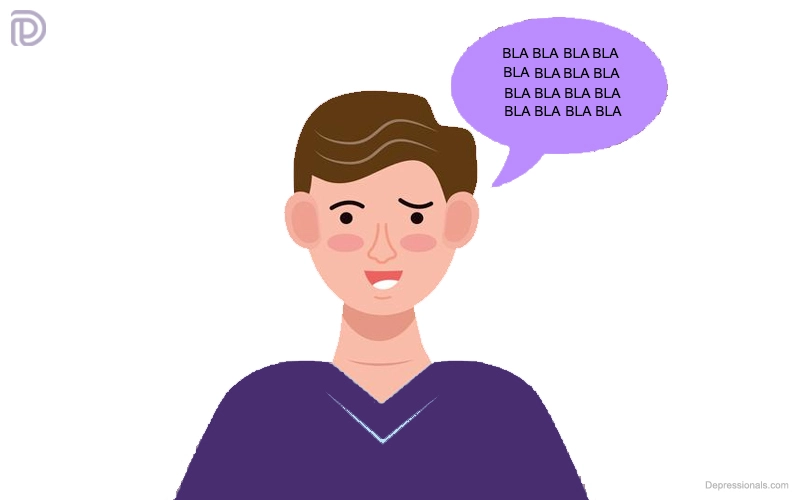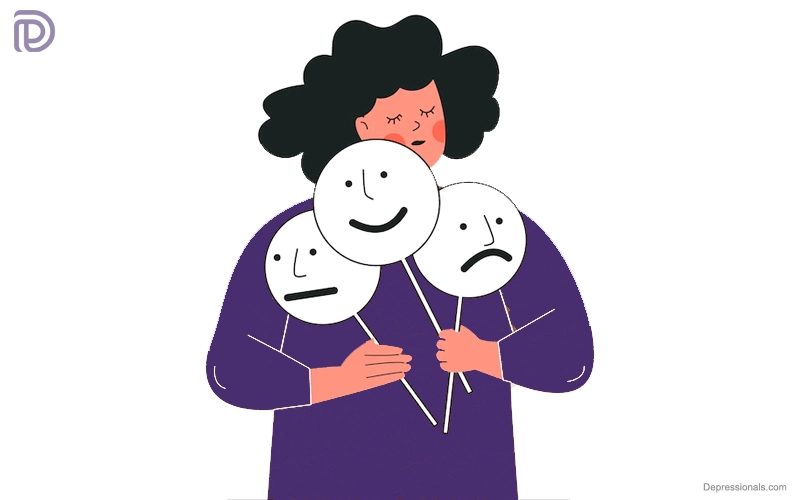What is obsessive-compulsive personality disorder?
In obsessive-compulsive personality disorder (OCPD), the person is overly concerned with order in their lives. A person suffering from OCPD may also feel compelled to apply their standards to their outside environment.
The following are some characteristics of people with OCPD:
- Expression of their feelings is difficult for them.
- Having close relationships with others is difficult for them.
- Even though they work hard, they can be inefficient due to their perfectionist attitude.
- Righteousness, indignation and anger are often their feelings.
- They are often socially isolated.
- Anxiety can occur when they are depressed.
Obsessive-compulsive disorder (OCD) is commonly confused with OCPD. However, they are different.
There’s no real indication that OCPD makes people think or act in a dysfunctional way. People with this mindset think and act as if their way is the only one that is right and everyone else is wrong.
Read: What are Obsession and Compulsion
What are the causes of OCPD?
It is unknown what causes OCPD. Many aspects of OCPD remain unknown, including the causes. Both genetics and childhood experiences may contribute to obsessive personality.
OCPD has been documented in some cases in adults who can recall experiencing it very early in life. Perhaps they felt they had to act perfectly or obey perfectly. The need to obey rules continues into adulthood.
Who is most at risk for OCPD?

Men who have this personality disorder are twice as likely to be diagnosed as women, estimates the International OCD Foundation (OCDF). Obsessive personality type is the most prevalent personality disorder, according to a study published in the Journal of Personality Assessment.
OCPD is commonly diagnosed in people who have existing mental health conditions. More research is needed to prove that OCPD is responsible for these diagnoses.
Furthermore, people with severe OCD are more likely to suffer from OCPD.
Also, check: Side Effects of Overthinking
What are the symptoms of OCPD?
There are several symptoms of OCPD, including:
- Having a perfectionism that prevents you from finishing tasks
- Formal, stiff, or rigid mannerisms
- Having a very frugal spending style
- Punctuality is imperative
- Paying extreme attention to details
- Putting work ahead of family or social relationships
- Keeping worn or useless items
- Lack of willingness to share or delegate work for fear that it won’t be done correctly
- Lists are a fixation
- Regulations and rules are rigidly followed
- A strong desire for order
- A sense of righteous obligation
- Ethical and moral codes that are rigidly adhered to
The symptoms of an OCPD make it difficult to function and interact with others.
You should know about Insomnia disorder
How is OCPD treated?
Treatment for OCPD typically consists of three components, including the following:
Cognitive-behavioral therapy (CBT)
Counseling in mental health is often based on cognitive behavior therapy (CBT). CBT involves meeting with a mental health professional regularly.
Your counselor will help you cope with anxiety, stress, and depression during these regular sessions. If you are receiving mental health counseling, you may be encouraged to put less emphasis on work and more emphasis on leisure activities, family and friends.
Medication
In order to decrease some anxiety associated with the obsessive-compulsive cycle, your doctor may prescribe a selective serotonin reuptake inhibitor (SSRI). SSRIs may also be prescribed along with regular psychotherapy and support groups. OCPD patients are usually not recommended to use prescription medications long-term.
Relaxation training
Stress and urgency can be reduced with relaxation training, which involves breathing and relaxation techniques. This is a common symptom of OCPD. Practices such as yoga, tai chi, and Pilates can help you relax.
Check: Types of Overthinking
How to cope with OCPD
It may be helpful to learn some strategies for dealing with OCPD along with seeking treatment. Some of these include:
- Self-education: It can be empowering to learn more about your condition. OCPD symptoms may help you notice when your behavior is caused by OCPD symptoms, so you can cope with them.
- Stress management: It’s always a good idea to keep your overall stress level low. Plan how you will reduce stress, so you will be prepared for whatever life throws at you.
- Self-care: OCPD can lead to a tendency to neglect yourself while you concentrate on a current task. Don’t forget to take care of yourself every day.
- Practicing mindfulness and meditation: The practice of mindfulness can provide you with the tools you need to spot situations in which perfection is causing anxiety, for example, and take steps to alleviate it. Stress can be relieved effectively through meditation, which pairs well with mindfulness.
OCPD vs. OCD
OCD and OCPD are conditions with their own unique and specific aspects, but they also share strong overlaps. They can be distinguished by a few things, however.
Presence of true obsessions and/or compulsions
The definition of OCD is the presence of true obsession (persistent thinking or feeling) and compulsion (constantly performing an irrational action). People who engage in these behaviors can do so in combination or on their own, and they hinder their ability to function and live freely.
A person with OCD, on the other hand, does not display irrational, repeated behavior or uncontrollable thoughts.
Recommended: Multiple Strategies To Control Overthinking
Obsessive thoughts or behaviors
Even if they are unable to control their behaviors or thoughts, OCD sufferers often feel distressed by them. However, typically, people with OCPD are inclined to think that the actions they take have a purpose and aim.
These traits can also lead to avoiding professional help, since people with OCPD may avoid seeking it. In some cases, OCPD can even benefit the individual, such as someone who is intensely dedicated to their work and detail-oriented, despite having difficulty in other areas.
Consistency of symptoms
Anxiety levels drive the fluctuation of OCD symptoms. The behavior tends to stay the same over time because OCPD is a personality disorder characterized by rigidity.
Recommended: How to help someone with Depression
How OCPD affects relationships
A person with OCPD’s constant need for control may cause difficulty in a relationship. There may be a tendency for them to plan every detail of your vacation in advance. There may be a particular manner and schedule by which each room of the house must be cleaned. Your work life might take priority over your relationship, or you may walk away from arguments.
The people around you might have different standards than you, if you’re the one with OCPD. The things around your house aren’t as tidy as you’d like them to be. Maybe you have a messy spouse or roommate. Their punctuality or frugalness may not match yours.
The good news is that it’s possible for people with OCPD to maintain healthy and long-lasting relationships with others despite all of these potential frustrations. If you or somebody you love suffers from OCPD, follow these strategies to keep the peace:
Do not focus on winning at all costs
People with OCPD may feel strong feelings of rightness, which can be particularly challenging. However, it is possible for those without OCPD to face these difficulties. During disagreements, don’t let your ego get in the way, and try to resolve disputes instead of winning them.
Take occasional breaks to clear your heads, but always communicate respectfully and thoughtfully. When expressing your perspective, use “I” statements. When blaming others, do not use “you” statements. When necessary, apologize without hesitation.
Appreciate each other
People with OCPD are sometimes prone to becoming overly critical. People not suffering from OCPD may also fall into this trap, focusing only on the shortcomings and rigidities of their friends and partners.
Make sure you express your appreciation for each other’s qualities, such as work ethic and reliability. Let them know how they have improved your life, whether it has been through their emotional support or their domestic contributions. The feeling of security is enhanced by this.
Be kind to your partner
OCPD people often have good intentions despite a tendency to be controlling. It’s likely that they’re dealing with anxiety or helplessness when they show annoyance or frustration. You can help with those feelings if you acknowledge them and ask how you can help.
OCPD patients must also acknowledge the other’s good intentions. Although they may not be as driven as you are toward perfection, neither one of you is perfect.
Self-care is important
Assertiveness may be necessary when dealing with someone with OCPD. Make sure you understand what high expectations are. It is important to let your loved one know if the cleanliness demands they make seem unreasonable to you.
Don’t try to overextend yourself and try to reach a compromise. Be aware that their way of doing things is not necessarily the same as yours.
Couples therapy can help couples whose relationships aren’t working. It may not be possible to work out a relationship with an abusive partner or a partner who is unwilling to change.
What is the outlook?
People with OCPD may have a better outlook than those with other personality disorders. OCPD treatment can help you understand how the symptoms can negatively affect others. Other personality disorders may make you more susceptible to addiction to drugs and alcohol. But OCPD may make you less susceptible to addiction.
The foundation of success for anyone who is suffering from a personality disorder is finding the treatment that works for them. It can help you develop empathy and interaction skills with the people you love.
Read: Schizotypal Personality Disorder
How can a spouse or loved one support someone with OCPD?
Pay attention to your partner’s obsessions and compulsive behaviors if you suspect your spouse has OCPD. If someone’s obsessions include: we can probably assume they have OCD or some other personality type that isn’t obsessive-compulsive personality disorder.
- Persuaded by danger
- Limiting your life to a few specific areas
- Bizarre or irrational
Behaviors are usually difficult to change in people with OCD. Their focus is on others instead of themselves.
A spouse or other loved one typically encourages an individual to seek treatment for obsessive-compulsive personality disorder. Unfortunately, approaching someone with OCPD about their behavior can be very difficult. Additionally, it can be beneficial for spouses, partners, and others close to someone with OCPD to seek support for themselves.
OCPD-related spouses and loved ones have access to a variety of support forums and groups. Those with OCD or OCD tendencies or personality disorders such as OCDPD can find support through the International OCD Foundation.






Generally I do not read post on blogs, however I wish to say that this write-up very compelled me to check
out and do it! Your writing taste has been amazed.
That is a good tip especially to those fresh to the blogosphere.
Short but very precise info… Thank you for sharing this one.
A must read article!
fantastic publish, very informative. I’m wondering why the other specialists of
this sector do not realize this. You should proceed your writing.
This actually answered my problem, thank you!
Hi there, its nice article on the topic of media print, we all be aware of media is
a wonderful source of data.
Pretty nice post. I just stumbled upon your weblog and wished to say that I’ve truly
enjoyed surfing around your blog posts. After all I’ll be subscribing to your rss
feed and I hope you write again soon!
What’s up to every one, because I am actually keen of reading this blog’s post to be updated regularly.
It carries pleasant information.
I am regular reader, how are you everybody? This paragraph posted at this web page is genuinely good.
Hello i am kavin, its my first time to commenting anyplace, when i read this piece of
writing i thought i could also make comment due to this good paragraph.
What a information of un-ambiguity and preserveness
of precious knowledge about unexpected feelings.
This article will help the internet people for creating new webpage or even a weblog from start to end.
What i do not understood is actually how you’re now not actually
much more smartly-liked than you may be right now. You are
very intelligent. You know therefore considerably on the subject of
this matter, produced me for my part believe it from so many varied angles.
Its like women and men aren’t interested except it is one thing to do with Woman gaga!
Your individual stuffs excellent. All the time care for it
up!
I would like to thank you for the efforts you have put in writing this site.
I really hope to check out the same high-grade blog posts by
you later on as well. In truth, your creative writing abilities has encouraged me to get my very own site now 😉
Thanks on your marvelous posting! I genuinely enjoyed reading it, you happen to be a great author.
I will be sure to bookmark your blog and will often come
back sometime soon. I want to encourage you continue your great posts, have a nice afternoon!
Very good blog! Do you have any recommendations
for aspiring writers? I’m hoping to start my own blog
soon but I’m a little lost on everything. Would you propose starting with a free
platform like WordPress or go for a paid option? There are so many options
out there that I’m completely overwhelmed .. Any suggestions?
Many thanks!
Thanks very nice blog!
I’m amazed, I have to admit. Seldom do I encounter a blog that’s both equally educative and interesting, and let
me tell you, you have hit the nail on the head. The issue is something that not enough
men and women are speaking intelligently
about. I am very happy that I stumbled across this in my search for something relating to this.
I every time used to read piece of writing in news papers but now as I am a
user of web therefore from now I am using net for posts, thanks to web.
Hi, I do think this is an excellent website.
I stumbledupon it 😉 I’m going to return yet again since I saved
as a favorite it. Money and freedom is the best way to change, may you be rich and continue to guide other people.
Saved as a favorite, I really like your web site!
I believe this is among the so much vital
info for me. And i’m happy studying your article.
But wanna observation on few common issues, The site taste is wonderful,
the articles is truly nice : D. Good process, cheers!
Great pieces. Keep posting such kind of information on your site.
Im really impressed by your site.
Hey there, You’ve done an incredible job. I’ll definitely digg it and in my opinion suggest to my friends.
I am confident they’ll be benefited from this site.
Good day! I could have sworn I’ve visited your blog before but after going through some of
the posts I realized it’s new to me. Nonetheless, I’m definitely delighted I stumbled upon it and
I’ll be bookmarking it and checking back often!
Wow, marvelous blog layout! How long have you been blogging for?
you make blogging look easy. The overall look of your website is wonderful, let alone the content!
I like the helpful information you provide in your articles.
I’ll bookmark your weblog and check again here regularly.
I am quite certain I will learn many new stuff right here! Good
luck for the next!
Today, I went to the beachfront with my children. I found a sea shell and gave it to my 4
year old daughter and said “You can hear the ocean if you put this to your ear.” She put the shell
to her ear and screamed. There was a hermit crab inside and it
pinched her ear. She never wants to go back! LoL I know this is entirely off topic but I had to tell someone!
Hej, jeg ønskede at kende din pris.
I want to thank you for this fantastic read!! I absolutely loved every little
bit of it. I have got you to bookmark to look at new things you post…
God bless you! Thanks.
It’s a piece of great information that is actually helpful. Good day!.
Thank you very much
I obligation nearly, as a reams as I enjoyed reading what you had to announce ‘, I couldnt advise but lose induce after a while. Its as if you had a wonderful grip on the participant matter, but you forgot to contain your readers.
Thanks for your tips about this blog.
Thank you a bunch for sharing this with all of us you really realize what you are speaking approximately! Bookmarked. Kindly additionally discuss with my web site =). We can have a link trade contract among us!
Thanks for sharing your ideas.
Thanks for the suggestions you reveal through this blog.
Excellent writeup!
This actually answered my downside, thanks!
I’m really enjoying the design and layout of your site.
It’s a very easy on the eyes which makes it much more enjoyable for
me to come here and visit more often.
I can’t believe focusing long enough to research; much less write this kind of article. You’ve outdone yourself with this material without a doubt. It is one of the greatest contents.
Thanks for your article. One other thing is when you are selling your property by yourself, one of the concerns you need to be alert to upfront is just how to deal with house inspection accounts. As a FSBO seller, the key about successfully shifting your property in addition to saving money in real estate agent income is awareness. The more you realize, the more stable your property sales effort will likely be. One area when this is particularly essential is reports.
I am typically to running a blog and i really appreciate your content. The article has really peaks my interest. I am going to bookmark your website and preserve checking for brand new information.
Hi, I think your blog might be having browser compatibility issues. When I look at your blog site in Safari, it looks fine but when opening in Internet Explorer, it has some overlapping. I just wanted to give you a quick heads up! Other then that, amazing blog!
Thanks for your post. I would also love to say that a health insurance specialist also works for the benefit of the actual coordinators of your group insurance cover. The health insurance broker is given a list of benefits wanted by individuals or a group coordinator. What any broker does indeed is try to find individuals or even coordinators which will best go with those requirements. Then he provides his recommendations and if each party agree, this broker formulates legal contract between the two parties.
Way cool, some valid points! I appreciate you making this article available, the rest of the site is also high quality. Have a fun.
It’s great to have such valuable information available to us.
Thanks for providing such valuable information
Thank you for another informative website. The place else may just I am getting that type of info written in such an ideal manner? I’ve a project that I’m just now running on, and I’ve been on the look out for such info.